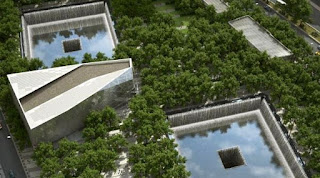The memorial and museum is located on the archeological site
of the previous “twin towers” of the World Trade Center, and some of their
remaining below-ground foundations are incorporated into the museum. The Ground
Zero site is located in the Financial District, and the plaza is accessible
from several streets, including Church, Dey, Albany, and Greenwich.
There are outdoor and indoor parts to this memorial. The
8-acre outdoor part consists of two reflecting pools/fountains (the two largest
manmade waterfalls in the country) that are located in the footprint of the
previous towers surrounded by a plaza filled with 400 white oak trees. The
outdoor plaza is open to the public; no ticket is required to view the name of
every person who passed in the attacks that is etched into the walls
surrounding the pools. The cost for adult entry into the indoor museum is $24.
(Of course, admission is complimentary for families of loved ones and first
responders.) Docent-led tours are available at certain times of day, or you can
purchase an audio tour for an additional fee. The museum space offers restrooms
on all levels. You must pass through a security check and metal detectors to
enter the building.
The museum is tastefully curated, and it seemed that the
creators intentionally separated the space into two areas: one more public and
one more private. The more open public area contains twisted metal from the
previous buildings, and remnants like vehicles and building parts. The more
enclosed private area contains personal memorabilia found (employee ID cards,
clothing, papers, shoes), which is segregated into a central area with several
doors to make an exit if you become overwhelmed by what you are seeing. The multimedia and interactive displays,
archives, and artifacts are educational, provide background and a
timeline, and portray related events at other sites, including those of the
1993 bombing. It is a reverent tribute to the nearly 3,000 victims of the
attack, as well as the thousands of people who survived and responded
courageously and compassionately in the aftermath.
The National September 11 Memorial and Museum
was something that we felt we had to see as visitors to New York City all our
lives. It is important to pay homage and to “Never forget”.























